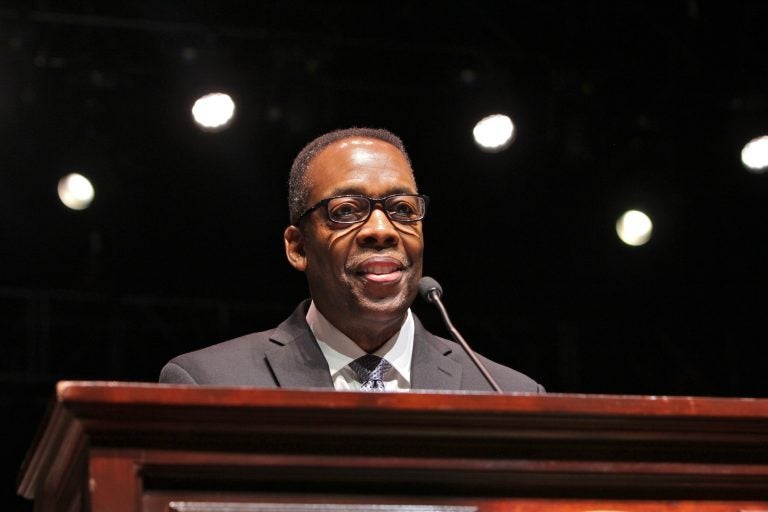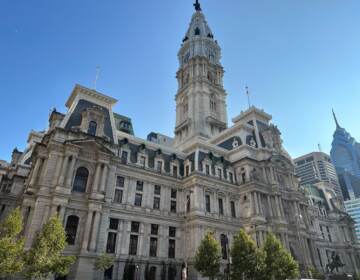Elected for life no longer? Darrell Clarke introduces bill to term limit City Council
Two proposed bills are on the council’s agenda. The city’s longtime “resign to run” rule is part of one measure, introduced by President Darrell Clarke.
Listen 1:31
Philadelphia City Council President Darrell Clarke. (Emma Lee/WHYY)
Term limits are on City Council’s agenda for the spring, with two proposals circulating around Philadelphia’s legislative body.
On Thursday, City Council President Darrell Clarke introduced a measure that would put a ballot provision before voters to create term limits of 20 years for councilmembers while getting rid of “resign to run,” a law that requires Philadelphia politicians to quit their current elected positions before they run for another one.
Philadelphia lawmakers have long disdained “resign to run,” but previous attempts to change the city charter to get rid of the provision have failed at the ballot box.
“There is this hue and cry for term limits, so I thought the consolidation of those two issues might actually get some traction,” Clarke said. “We are putting it in the mix to have a conversation about removing the provision of resign to run, and if that is enacted I am prepared to possibly, and I do say possibly, support a five-term limit. But not one without the other.”
Last week, Councilmember Allan Domb introduced legislation to create a four-term limit for City Council, allowing members to serve a total of 16 years.
Term limits are massively popular among voters — Domb received a round of applause when he introduced his bill — but political scientists argue that they do more harm than good.
It takes a long time to build up policy expertise or to learn how to get things done in a legislative body, so experience helps people become more effective at their work. Term limits also may be incentives to lawmakers to focus on their next jobs, potentially driving them into lobbying firms and other government-adjacent work.
Many of the arguments against term limits are obviated by the length of the limits Domb and Clarke have proposed, however.
“Those effects would not be anywhere near as stark under the configuration that Philadelphia is considering,” said John Carey, a political science professor at Dartmouth College and an expert on term limits. “Sixteen years or 20 years is enough time to build up some experience. This is a moderate solution. What people really don’t like is somebody who’s been in for so long that they appear to be electorally impregnable.”
Historically, many Philadelphia councilmembers have served for decades. Former Council President Anna Verna held her seat for 36 years, former Mayor John Street served for 19 years, and Councilmember-at-large David Cohen sat for 27 years (during his last stretch in the body). Republican Councilmember Brian O’Neill has represented the Far Northeast since 1980.
But the norms seem to be shifting. Only four of the current members of City Council were first elected before 2011.
Clarke’s legislation also would establish five-term limits for the sheriff, the three city commissioners and the city controller.
If Clarke’s term-limit bill won’t do much to change City Council as it currently operates, the council president’s ballot initiative could still prove popular enough to convince voters to get rid of “resign to run” too.
Here’s the exact wording of Clarke’s proposal:
Shall the Philadelphia Home Rule Charter be amended to provide that an elected official of the City may become a candidate for nomination or election to any public office without first resigning from their current office and that Councilmembers and the City Controller shall not be eligible for election for more than five consecutive terms of office that begin on or after July 1, 2020?
Philadelphia is one of the only jurisdictions in Pennsylvania that requires its politicians to resign from their current offices before running for other posts. Political observers have long argued that this quirk of municipal law puts the city at a disadvantage.
“Philadelphia politicians cannot run for a state office without resigning and, therefore, you don’t see many candidates from Philadelphia running for statewide office,” said Larry Ceisler, a longtime political consultant in the city. “I think that it restrains and holds back our city’s ability to have more influence in Harrisburg.”
It also complicates the lives of councilmembers who want to run for mayor. Although Clarke’s legislation would not allow someone to be listed on the ballot for both a council seat and the mayoralty, it would allow councilmembers to openly explore running for mayor without stepping down.
Given that there are currently six members of City Council rumored to be considering a run for mayor in 2023, getting rid of “resign to run” would no doubt be a popular move there. It could also allow Mayor Jim Kenney to run for governor in 2022 without stepping down, a rumor that’s been circulating around City Hall since last year.
“If you’re going to run for mayor, it takes a while to get geared up,” Ceisler said. “You have to raise money, you have to do a lot of things. And many of these steps would trigger the resign-to-run rules, so this would allow current members the possibility of running without penalty.”
A scheduled committee meeting on Domb’s bill next week is being delayed, so it is unclear when either of the proposals will receive a hearing. City Council will have to act by Feb. 27 if the question is to appear on the April primary ballot. If not, the November election is also a possibility.
WHYY is your source for fact-based, in-depth journalism and information. As a nonprofit organization, we rely on financial support from readers like you. Please give today.







